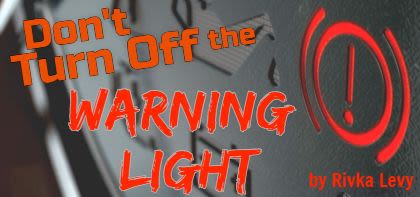
Don’t Turn Off the Warning Light
Our negative emotions are like warning lights that we need to change something about our life. To ignore them or drug them away, is like ignoring a warning light in your car.

Now that you’ve got your GodJuice back up to strength and humming along through your daily personal prayer sessions, it’s time to tackle the next thing that could be closing your body’s energy down and making you sick: bad emotional health habits.
Why your Emotions Hold the Key to Your Health
These days, every emotion except ‘fake happy’ seems to have gone out of fashion. You’re allowed to be stressed, you’re sometimes allowed to be angry (especially at terrorists and ‘injustice’) and you can cry when your family pet bites the dust – but that’s about it.
Today, society is so scared of emotions, particularly negative emotions, that you get hustled straight onto medication if you even show the smallest sign of deviating from ‘fake happy.’
In theory, you can see how it kind of makes sense: I mean, no one actually enjoys feeling sad, or lonely, or worthless, or anxious. If there’s a fast, effective way of switching those feelings off, why suffer?
There’s just one problem with this view: It’s complete baloney.
Spiritually, God is sending you your feelings and emotions, even your negative ones, for a good reason. Each time you get sad, frustrated, hurt or depressed, that emotion actually contains a big clue about what you might need to work on, change or fix to start living the happy, healthy, fulfilled life that God has planned for you.
Emotionally, your feelings represent your true self; the ‘inner you.’ If you try to turn your emotions off and disconnect from the ‘real you,’ you just end up struggling to fulfill your potential in life. It becomes more difficult to develop genuine, authentic relationships with other people and feel happy and content – even if you’re externally very successful and apparently ‘have it all.’
Your feelings don’t just magically disappear because you’re taking medication. All the meds do is break that connection between your conscious awareness of what you’re truly feeling, and the feeling itself.
To put it another way, it’s like when the gas light starts flashing on your dashboard. That’s a sign that you need to stop at the next gas station and refill your tank. That little light is really saving you a huge amount of stress and trouble further on down the road. It’s giving you plenty of warning to do what you need to do to replenish your fuel, so you don’t get stranded by the side of the road in the middle of nowhere.
Your negative emotions do the same thing. When you get angry, or sad, or critical, it’s a warning light that you have habits or behaviors or beliefs that are hurting you, not helping you. You can switch the light off – and many people do – but the underlying problem won’t go away.
Let’s use anger as an example. If you don’t deal with the underlying cause of your anger, your feeling of anger then backs up in your energy system (often, directly affecting the Gallbladder Meridian) – and before you know it, you’re experiencing sciatica (excruciating shooting pains down your legs), migraine headaches, or you’ll start grinding your teeth in your sleep.
The problem can still be fixed at this stage, just like a car can still be filled up with gas even when it’s broken down in the middle of nowhere – but it’s definitely going to take more time and effort to get the show back on the road.
How to Deal with Emotions in a Healthy Way
God gave you your negative emotions, and they’re meant to serve a useful purpose. You just need to know how to relate to them and deal with them in a healthy way.
The ancient Jewish mystical tradition called the Kabbalah explains that your emotions are the connective material between your soul and your body; they connect how you think to how you really feel. To put it another way, your emotions are the principal route that your subconscious uses to communicate with your intellect (the part of your thought process you actually have some direct control over).
Let’s go back to the anger example and see how this works in practice. Say you have a friend who routinely makes you feel angry. Maybe she shows up at your house unannounced, or she often puts you down and embarrasses you in front of your peers, or she’s very untrustworthy and she frequently make promises she doesn’t stick to.
When someone routinely treats you in an uncaring, disrespectful manner, you usually start feeling pretty angry about that. If you’ve trained yourself to just tuck your feeling of anger away, and to continue to pretend that everything’s fine, even when it really isn’t, you are missing the message that God has hidden in your negative emotion.
The message will be different for each of us, but it could be something along the lines of:
– You need to strengthen your boundaries and stop letting people take advantage of you.
– You need to look inwards and work out why you’re willing to stick around with someone who mistreats you.
God will make sure you get exactly the message you need in order to begin the next stage of your process of growth and development. When you start paying attention to your negative emotions, you’ll learn some amazing things about yourself and why you react to certain people and situations the way you do.
In nearly every circumstance, your negative emotion is coming to tell you that one of the following three areas is out of balance:
- – Healthy Compassion
- – Sensible Accountability
- – Appropriate Kindnesses
Together, these three things are the foundation of good emotional health. If they’re balanced, you’ll feel great. If one of them gets out of balance – and in today’s world, that can happen all too easily – the repercussions on your physical health and emotional well-being can be tremendous.
Over the coming articles I am going to explain each of these foundations. You’ll discover why imbalances in these three areas can affect your health so fundamentally at every level, and what you can do to get back into emotional equilibrium.














Tell us what you think!
Thank you for your comment!
It will be published after approval by the Editor.